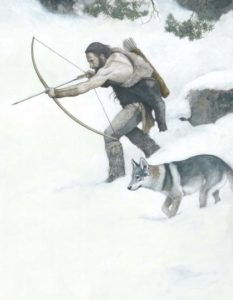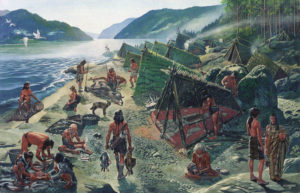“There are many scenarios that we can think about where either justice or prudence is lacking, and so the life of pleasure is not complete and cannot be labeled Epicurean. These exercises of putting before our eyes various hypothetical scenarios, or thinking back to real ones we’ve encountered, may help to demonstrate what the founders were thinking about and discussing when they established Principal Doctrine 5.”
In a previous article, Hiram discussed action theory within Epicureanism and offered the training tool of the ‘Four Sisters’ of pleasure, prudence, nobility, and justice. Let us put the following hypothetical scenario under the scrutiny of our eyes to understand better how the ‘Four Sisters’ tradition shapes our actions and inform the decisions we make within the Epicurean framework.
The Parable of the Hunter
A long time ago, the world was cold and life was harsh. Deep in the Ice Age of Europe, there existed a hunter-gatherer tribe, a band of early humans. One member of the tribe was designated as the Hunter, whereas other members of the tribe filled different roles in the community. They naturally developed amongst themselves a proto-economy of bartering – the Hunter provides meat, and in return receives other gathered foods, crafted goods, and services in exchange.
Normally, all the members of the tribe would wait out the winter, relying on the food supply they had built up over the warm seasons. However, it has been a particularly harsh winter and the food is running out. With careful rationing, it looks like there is only enough food for the tribe to last a month or so before starvation sets in.
In a measure of desperation, the community decides to set aside a large share of its remaining food for the Hunter’s personal needs on the promise that the Hunter will go off into the wilderness for a period of time and return with an animal to alleviate the coming hunger. After sharing, the tribe has less than two weeks’ worth of food remaining, whereas the Hunter’s food is enough for him to survive the frigid landscape without help for about as long as the tribe would while waiting for him, not longer. He will need to keep his energy up if he is to be successful in the hunt, and carrying back an animal will also be very tiring. So, he will be consuming more food than his friends and family back home. The Hunter gives his word, SWEARING AN OATH that he will return before what little they have left runs out.
After the Hunter has left and wandered far enough away from the tribe to not be observed, he sits down by a fire to collect his thoughts and develop a plan of action. A number of options are present to choose from.
He feels a PAIN in his stomach and so eats some of the berries from his pouch, mildly addressing his hunger. He also reduces the pain of thirst with a swig of water from his leather waterskin. After doing so, he reflects on the PLEASURE of consumption and realizes that he can continue to indulge these pleasures because of the large amount of food in his bag. He could abandon his mission and keep the food for himself, continuing to eat and drink until he is beyond satisfied. However, he quickly realizes that this would cause him to run out of food much faster than he had planned, and hunger would quickly set in again before he has the means to ensure his long-term satisfaction. Recognizing this, he decides to continue the hunt and re-evaluate his situation when closer to his prey.
Due to seasonal migration, the herds of elk have ventured far from the tribe’s village. After a trek of about a week, the perilous Hunter tracks the herd to a semi-barren woodland, with barely enough morsels of foliage left for their graze. As an accomplished Hunter does, he stalks his prey until the most opportune time to strike. It would be worse for him to miss with his bow and arrow and have to give chase to the herd once it has started to run off, so he bides his time.
While he waits for the sun to rise on the last night before his planned final rendezvous with his quarry, he contemplates the future. The winter should be ending soon and the snows will melt in three weeks or so. He notes that with the food he has been given, he could just about make it to that time if he exerts himself less from now onwards and forgets about the idea of bringing back any animal he manages to find tomorrow. What’s more, with any animal at all he would actually be in a state of abundance, relying on the elk meat primarily and saving his packed food as a backup.
These ideas are all pleasant to him at first, until his mind focuses back to the condition of his friends and family that he would have to leave behind. It pains him to think about them all dying of starvation, and what is more, he would feel a pang of guilt when they realize that he betrayed his word and won’t be coming back.
Additionally, if by some chance a few of them did manage to survive to the springtime, he would live in perpetual FEAR of being hunted, for he knows that some of the elders and youths of the tribe also have some knowledge of tracking. Such a violation could not go unpunished and they would pursue his trail until they found him and exacted JUSTICE. Taking all of these possible future scenarios in mind, he knows what the best thing to do is.
The dawn arrives and the Hunter comes upon the herd, which had not traveled much further. The elk are loosely dispersed among trees, searching for hardy berries and other edible leaves. They aren’t too picky and options are scarce. One of the animals nearest to him munches away blissfully and unknowingly. Being very skilled, the Hunter carefully sights his bow, waiting for the exact moment. He looses his stone-tipped arrow and it finds its mark. He whispers lowly a solemn word of thankfulness to the animal. After some time, he prepares a makeshift sled and loads his handiwork on it to ease his return to his tribe and his people.
After some two weeks of absence, the Hunter returns to his village to find the people just barely holding on. Hunger had set in, but not yet death. Upon seeing him, they rush over and form a cheerful parade. He greets them one by one, exchanging glances, smiles, and intimate embraces. They REJOICE to see that his journey was a success and that he has brought with him the means for all to survive to the next season. They express a deep and sincere GRATITUDE for what symbolizes to them the guarantee of the continuation of life, in spite of all the DIFFICULTIES that it may come with. The Hunter rejoices tearfully with his friends and family and derives PLEASURE not just from the RECOGNITION of familiar faces who were eager to greet him or the quenching of thirst and satiation of hunger at the subsequent feast, but also from the NOBILITY of his own personal character, which GUIDED him to CHOOSE the most pleasant possible outcome, in conformity with PRUDENCE and JUSTICE.
Dewdrops glisten in the leaves of the trees and on the blades of grass. Spring has arrived and the tribe lives on to see another day. Though all these events happened a very long time ago and all of our characters have long since departed, the BLESSEDNESS of the memories of their time spent together and the friendships they enjoyed live on as IMMORTAL GOODS.
Review of the ethical considerations of this Parable:
1) Course of action solely guided by pleasure but lacking prudence and justice:
The hunter continues to pursue the pleasure of consumption without regard for his inventory or the future.
Projected Result: Short-term pleasure but long-term pain. Pleasure not at its limit.
2) Course of action guided by pleasure and some prudence but lacking justice:
The hunter considers keeping his kill for himself and not returning to the tribe, instead waiting out the winter on his own with his supply and kill.
Projected Result: A longer-term pleasure than previous, but the nagging anxiety of being hunted is inescapable. Pleasure not at its limit.
3) Course of action guided by pleasure and justice and prudence:
The hunter honors his oath and returns with the food for the tribe. He keeps faith with the tribe and in return receives the pleasure of gratitude, of seeing their faces again, of sharing meals, of recognizing his own personal character, and of being accepted into a community of loved ones providing friendship and protection from the hardships of the state of nature.
Result: Longest-term pleasure of all. Pleasure at its limit.
Prudence and the recognition of the pact of natural justice has helped our hunter to ascertain that without these, all would lead to outcomes deficient in pleasures and with significant accompanying pains in the long term. Pleasure is still the sovereign guide, but it needs the counsel and advice of practical wisdom and just action to ensure the most complete life.
This article was composed by Friend Harmonious.


